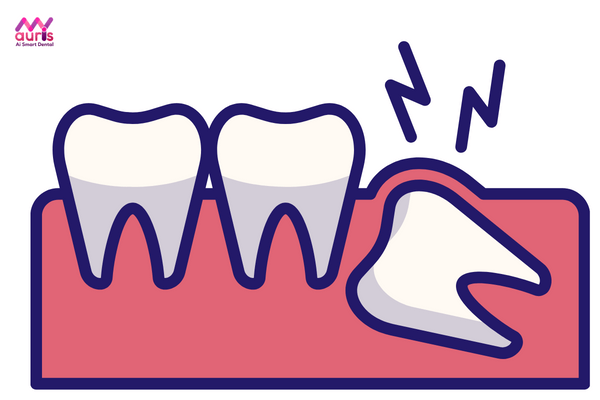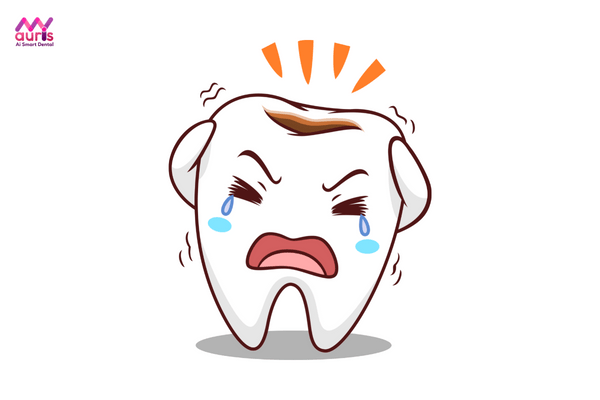Wisdom teeth are the last teeth to grow on the jaw when a person reaches adulthood. When these teeth grow, they cause a lot of trouble because of pain or complications from oblique, crooked, or impacted growth. Sowhich teeth are wisdom teeth, this article will help people better understand wisdom teeth to have effective ways to handle them when they start to “move”.
What are wisdom teeth?
What are wisdom teeth?
Wisdom teeth, also known as teeth number 8, are the third largest molars growing in the back of the jaw. Wisdom teeth begin to grow when they reach adulthood between 17-25 years old. However, depending on the person, some people grow earlier and later than this age.
Wisdom teeth are controversial because they do not perform obvious functions but also cause trouble because of pain and complications that affect oral health. Therefore, the world of dentistry really still cannot agree on whether this tooth should be removed as soon as possible or not.

In total, there will be 4 wisdom teeth, growing at the end corner of each jaw. The moment wisdom teeth grow, the human jaw bone stops growing. Therefore, there is not enough room for this tooth to grow, so most of the time it will cause crowded teeth, crooked growth, oblique growth, horizontal growth,…
Ways to grow wisdom teeth
When people know what wisdom teeth are, they will also be able to observe the condition that these teeth are affecting their health. However, the number of wisdom teeth is different for each person, some people grow 1-2, some people grow all 4 teeth. Some people will not even grow any wisdom teeth.
Some common types of wisdom teeth growth:
- Wisdom teeth grow straight: for jaws with room and “soil” for wisdom teeth to grow, it only causes pain when the teeth emerge from the gums. After the teeth have grown straight normally, there is no more pain and no invasion or impact on the adjacent teeth.
- Misaligned wisdom teeth: this is the most common case. Wisdom teeth that don’t have enough room will grow in and can pierce tooth number 7 or pierce the cheek, tongue, etc. This case causes more intense pain, discomfort, and if not treated promptly, it will affect oral health.
- Intruded teeth: this is a quite dangerous case because you will feel pain but you will not see the wisdom teeth grow. Because they are growing underground, X-rays must be taken to see the condition of the teeth.

What are wisdom teeth that cause many complications? dangerous
Wisdom teeth are the obsession of most people because they are not only painful but cause many complications that affect health.
Tooth decay
Tooth decay is a disease that frequently occurs in wisdom teeth. Especially misaligned and crowded teeth. Because the position of wisdom teeth is at the end of the jaw, it is very difficult to clean and remove food debris and plaque. Combined with that, teeth that are only partially or misaligned can easily cause food to get stuck.
Thus, bacteria accumulate, attack and damage tooth enamel, leading to tooth decay. If not detected in time, it can affect neighboring teeth.
Gingivitis
The accumulation of food along with plaque that has not been cleaned for a long time, leads to gingivitis around the roots of the teeth. If gingivitis is severe, pus can form causing infection and bad breath.

Destroys bones and teeth
When wisdom teeth grow crookedly or protrude into neighboring teeth, it will cause that tooth to become damaged. damage, loosening, bone loss, leading to tooth loss.
Nerve effects
Impacted wisdom teeth have the risk of developing tumors and cysts, causing the jawbone to weaken. Not only that, but wisdom teeth also compress and affect the nerves, leading to sensory disorders in the mucous membranes, cheeks, lips, etc.
Should wisdom teeth be extracted? Which teeth are wisdom teeth?
Wisdom tooth extraction often makes people worried because of the danger and fear of pain. However, in cases where wisdom teeth are crooked, slanted, impacted, etc., or complications have appeared, the doctor will prescribe tooth extraction. This helps limit dental disease problems, preserve the remaining teeth, and also overcome the complications being encountered.
However, wisdom teeth extraction is quite complicated, requiring the doctor’s technique and skills as well as supporting equipment and machinery. In addition, clinic quality and sterile conditions must also be guaranteed to avoid the risk of cross-contamination and infection.

A skilled and experienced doctor will judge the condition and perform the correct technique without causing damage. or lead to complications after extraction.
What should you pay attention to after wisdom tooth extraction?
To reduce complications and quickly recover from the wound spit, everyone should note:
- Have a healthy, scientific diet, supplementing foods that heal wounds quickly, fight inflammation, and provide vitamins and minerals for the body.
- Do not eat foods that are too hard, too chewy, have a strong sour taste or are too hot and spicy
- Avoid crunchy foods that easily stick to the teeth and cause the extraction inflammation
- Abstain from alcoholic beverages, carbonated drinks, and stimulants
- Immediately after the anesthetic wears off, use ice to apply 15-20 minutes. This helps reduce swelling and pain
- If you cannot brush your teeth, you should gently rinse your mouth with diluted salt water to clean plaque and remove bacteria.
- Use pain relievers as prescribed by your doctor
- If any unpleasant symptoms appear, see a doctor as soon as possible

Through this, everyone has learned what wisdom teeth are along with information related to these teeth. Hopefully everyone will have useful knowledge, thereby having the most appropriate and effective treatment and care measures. For more accurate information, please contactMy Auris dentistry for advice and solutions Please answer in detail.
Anh Thy





